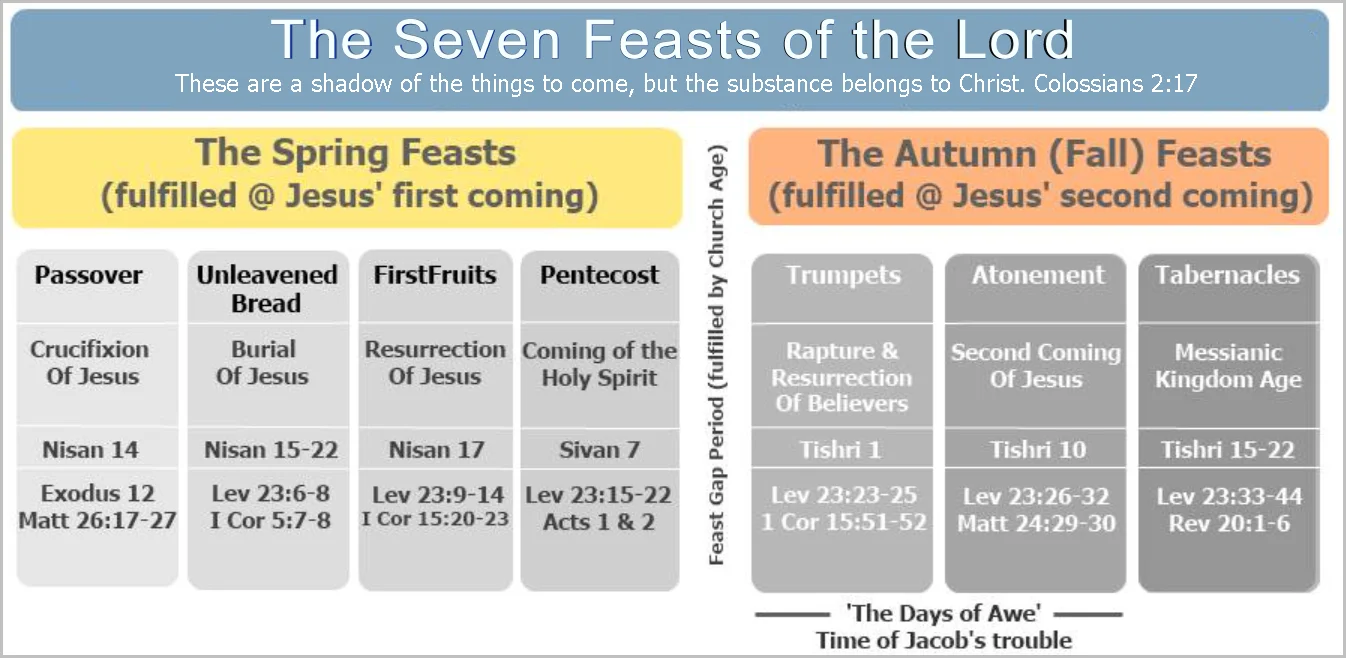







 jesusplusnothing.com
jesusplusnothing.com
The Abomination of Desolation will happen on April 16, 2028, on the Feast of First Fruits or Yom HaBikkurim,
3.5 years later at the mid-point of the Tribulation
The Rapture will happen about Sep 27, 2030 on the Feast of Trumpets or Rosh Hashanah.
[This feast is determined by the sighting of the new moon which can happen over a two-day period and
so, NO ONE KNOWS THE DAY OR THE HOUR.]
Armageddon and Jesus second coming will happen on Sep 26, 2031 on Day of Atonement or Yom Kippur.
"Even so, come, Lord Jesus!" (Revelation 22:20 KJV)
Passover (Pesach):
Jesus is often referred to as the "Passover Lamb," signifying his sacrifice on the cross to redeem humanity, mirroring the Passover lamb sacrificed by the Israelites in Egypt.
Celebrated in the month of Nisan (March/April), Passover commemorates the liberation of the Israelites from slavery in Egypt. It involves the sacrifice and consumption of a lamb, unleavened bread (matzah), and the retelling of the Exodus story.
Feast of Unleavened Bread (Chag HaMatzot):
This feast, following Passover, represents the need to remove sin from one's life, aligning with the concept of Jesus' sinless life.
This seven-day feast immediately follows Passover. It involves the removal of leaven from households and the consumption of unleavened bread. Symbolically, the removal of leaven represents the removal of sin and impurity from their lives. It serves as a reminder to live in righteousness and to rely on God’s provision.
Feast of Firstfruits (Yom HaBikkurim):
Jesus' resurrection is seen as the "firstfruits" of the harvest, signifying the first of many who will be resurrected through him.
Taking place during the week of Unleavened Bread, the Feast of Firstfruits was an agricultural festival, marking the beginning of the harvest season in ancient Israel. It involved the offering of the first sheaf of the barley harvest to God as a sign of gratitude and trust in His provision.
Feast of Weeks (Shavuot or Pentecost):
The descent of the Holy Spirit on the disciples at Pentecost is seen as the fulfillment of this feast, representing the outpouring of God's Spirit on believers.
Celebrated seven weeks (50 days) after the Feast of Firstfruits, this feast commemorates the giving of the Torah (the Law) to Moses on Mount Sinai. It is also associated with the harvest of wheat. It also marked the completion of the wheat harvest. On this day, the Israelites presented their firstfruits of the wheat harvest and offered thanksgiving to God. In later Jewish tradition, Pentecost gained additional significance as it became associated with the giving of the Holy Spirit and the birth of the early Christian church.
Feast of Trumpets (Rosh Hashanah):
This feast foreshadows the "trumpet call" announcing the return of Jesus at the second coming.
Observed on the first day of the seventh month (Tishrei, September/October), this feast marks the Jewish New Year. It is characterized by blowing the shofar (a ram’s horn) and reflection on repentance and preparation for the Day of Atonement.
Day of Atonement (Yom Kippur):
This day of repentance and cleansing is often interpreted as a prophetic picture of Jesus' ultimate sacrifice for sin on the cross.
This solemn and holy day takes place on the tenth day of Tishrei. It is a time of fasting, prayer, and repentance, focusing on seeking forgiveness for sins and reconciliation with God. It is believed that on this day, the high priest entered the Holy of Holies in the Tabernacle or temple to make atonement for the sins of the people.
Feast of Tabernacles (Sukkot):
This feast, celebrating dwelling in temporary shelters, is seen as a symbol of the future dwelling of God's people with him in the new heaven and new earth, potentially relating to the final consummation of God's kingdom.
Celebrated for seven days beginning on the fifteenth day of Tishrei, Sukkot commemorates the Israelites’ journey through the wilderness after leaving Egypt. It involves dwelling in temporary shelters (sukkahs) and rejoicing before God.
These feasts held deep religious, historical, and agricultural significance for the Israelites, and they are still observed by Jewish communities around the world to this day.
The feasts also hold significant foreshadowing for Christians that will play out in the end times.
from: "Biblical Hebrew Feasts: Significance, Purpose, and Observance"
breathofthespirit.org